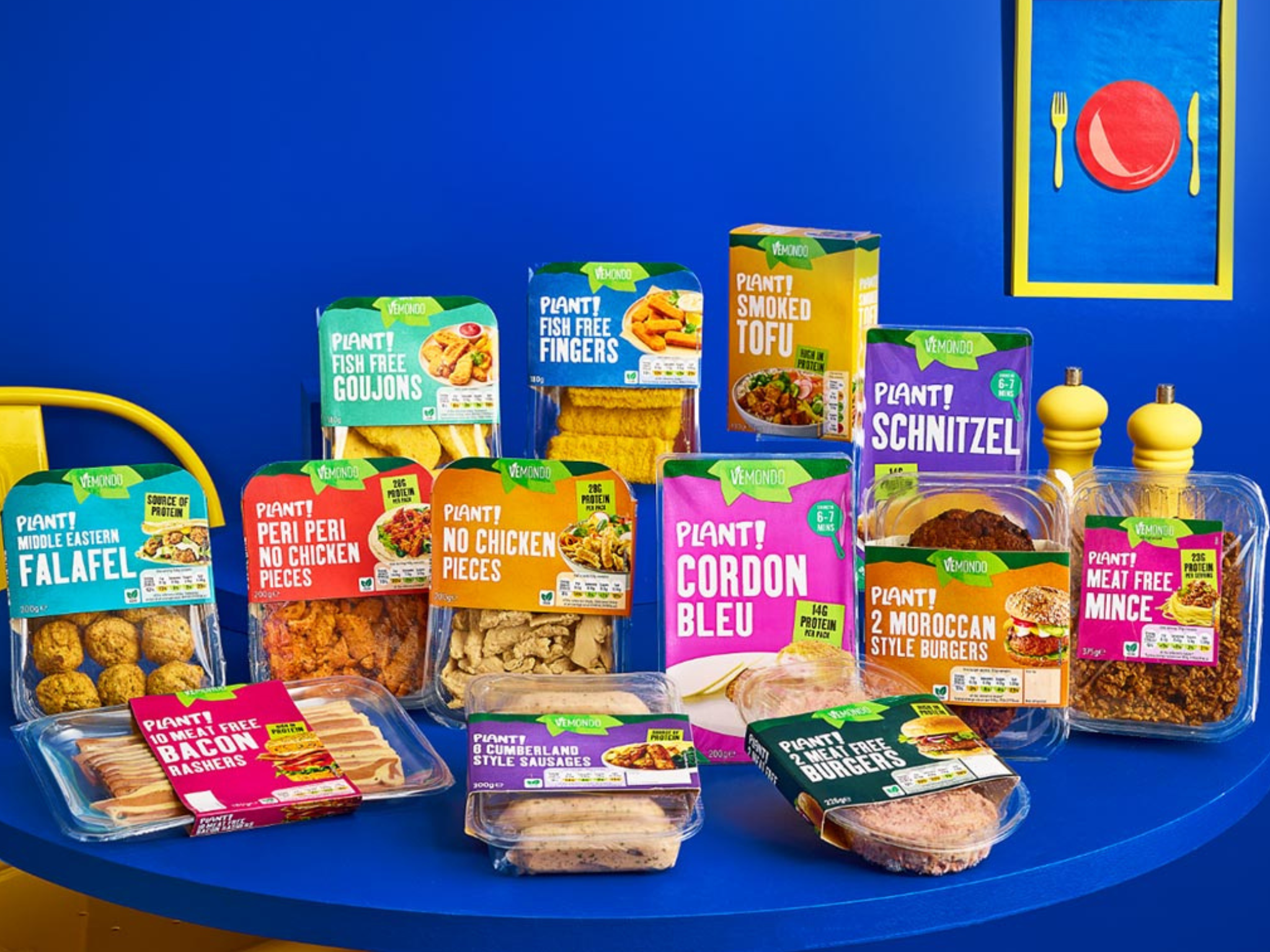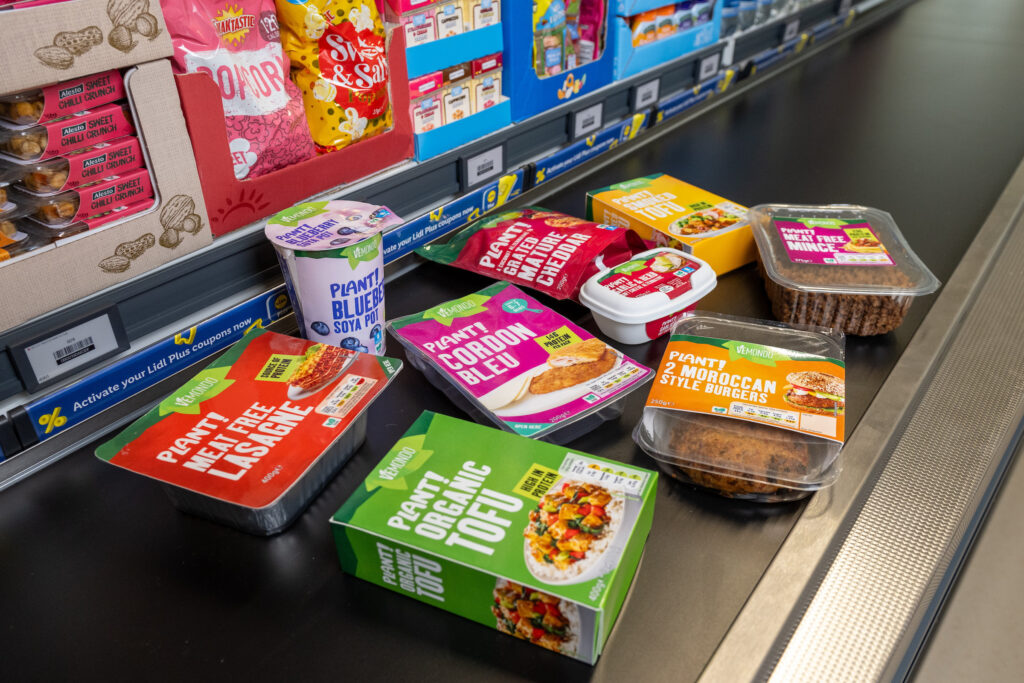
German discount retailer Lidl has increased the sales of healthy food in the UK by 80% since 2019, two years ahead of schedule, after becoming the first supermarket to align with the Eat-Lancet Planetary Health Diet.
Fibre, healthy food, and own-label meat and milk alternatives – Lidl GB has surpassed its sales targets on all these fronts faster than it anticipated.
The discount supermarket has released its latest sustainability report amid its bid to align with the Eat-Lancet Commission’s Planetary Health Diet, which emphasises a plant-forward eating pattern for better human and environmental health.
Sales of healthy food increased by 82% between 2019 and 2023, rising to 83% a year later, exceeding Lidl’s target of an 80% hike by 2025. Likewise, the company achieved a 22% increase in fibre sales in 2024, also two years ahead of schedule.
And as it reported in September, sales of plant-based meat, dairy and other products under its own-label brands shot up by 694% last year from a 2019 baseline, blowing past its target of a 400% growth by 2025.
All this comes three months Lidl GB introduced a new logo for use on private-label products that align with the Planetary Health Diet, becoming the first retailer to actively fit its businesses into this framework.
The Eat-Lancet Commission’s updated report, released last month, stated that the Planetary Health Diet could prevent 27% of early deaths from happening globally, reduce emissions by over a third with supportive policies, and lower the amount of money people spend on food.
“Aligning our strategy with the Planetary Health Diet is a long-term commitment to building a healthier, more sustainable food system,” said Richard Bourns, chief commercial officer at Lidl GB. “It’s delivering measurable impact – beyond the basket – by making healthy and sustainable food more accessible and affordable.”
How Lidl is supercharging plant-based sales

Over the last year, Lidl has made several moves to lead the retail sector’s health and sustainability transition. It implemented targets based on the Planet-Based Diets methodology devised by the World Wide Fund for Nature (WWF), aiming to grow the proportion of plant-based foods sold by 20% globally by 2030 (in the first year, it has boosted these sales by 3%).
In the UK, it plans to make 25% of all protein sales come from plant-based sources by 2030. This share has increased incrementally, from 14.4% in 2021 to 18% last year. Likewise, it plans to have dairy alternatives make 12% of all dairy sales by the end of the decade – as of 2024, that share sits at 6.3%.
Meanwhile, whole grains now account for 15.3% of all grain sales, up from 12.3% in 2023 and on track to meet the 25% target by 2030. Lidl is also looking to grow its fruit and vegetable sales by 35% between 2021 and 2026 – by last year, it had managed a 16% increase.
A key lever of Lidl’s plant-based success has been the affordability factor. Many of the products under its private-label vegan brand, Vemondo, are now priced the same as conventional meat and dairy in several markets.
And in the UK, it revitalised the brand at the end of last year with new packaging and renamed it Vemondo Plant, giving it a dedicated chiller bay for easy access in-store. The range has since been tripled in size, with 28 new products.
These changes are in line with Lidl’s net-zero ambitions for 2050 and the Planetary Health Diet. And this week, the company convened experts and leaders from across the food system, from farmers to academics, to explore practical solutions that build on the EAT-Lancet report.
Still work to do on scope 3 emissions
“The progress outlined in our report shows we’re matching growth with real sustainability progress,” said Bourns. “From sourcing materials responsibly and reducing emissions, to investing in British farming, we’re proving sustainability and value go hand-in-hand.”
Lidl has committed to reducing its scope 1 and 2 emissions by 70% by the end of the decade. Its scope 1 emissions have reduced by 11.4% in that time, but since 2021, its scope 2 output has increased by 12.4%. In any case, it is the scope 3 figure (which accounts for all supply chain emissions) that needs addressing, given it accounts for 98% of the company’s climate footprint.
The supermarket has pledged to reduce forest, land use and agriculture scope 3 emissions by 42.4% from a 2022 baseline. But in the two years since, these emissions have increased by 6.9%.
That said, Lidl GB has made several sustainability strides in this time. Nearly all (98%) of its critical raw materials are sourced from verified sustainable sources, with a target of reaching 100% by year-end. It also sells the highest volume of Fairtrade cocoa among supermarket private-labels in the UK.
The discounter uses 100% renewable energy now, and is on track to reduce its own-label plastic packaging by 40% next year, with recyclability rates already reaching 95%. Innovations like vacuum-packed mince have cut plastic use by 63%, a measure that has also halved in-store food waste. Speaking of which, Lidl donated 18.5 million meals via its food surplus and customer donation schemes in 2024.
“Our customers expect us to lead with purpose, and we’re proud to be doing just that. By embedding sustainability into the heart of our operations, we’re not only protecting the planet – we’re supporting communities, empowering suppliers, and delivering the quality and value our customers rely on every day,” said Bourns.
The post Lidl GB Exceeds Healthy Food Sales Target in Shift Towards Eat-Lancet’s Planetary Health Diet appeared first on Green Queen.
This post was originally published on Green Queen.